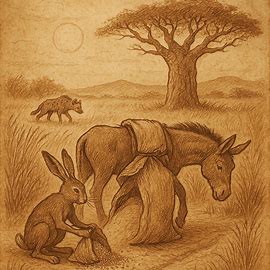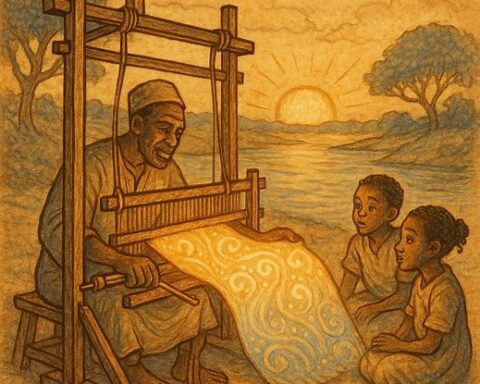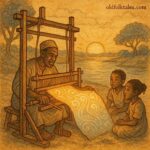Long ago, in the savannas of Burkina Faso, famine swept through the land so harshly that even the strongest trees bent under the cries of the hungry. Families searched the dusty earth for roots, children cried for porridge, and the fires in many hearths went cold. In this desperate season lived two companions, Ba-Katrc the Hyena and Mba-So:imba the Hare. Though they were unlikely friends, one slow and foolish, the other quick and clever, they shared the same hunger and the same fear of starvation.
One day, as the sun burned mercilessly over the empty fields, Hare turned to Hyena and proposed a grim solution.
“Brother,” he said, “there is no food left. Let us each sell our mothers in the market and use the millet we gain to survive this famine.”
Hyena, blinded by desperation and simple in his thoughts, agreed without hesitation. Both animals returned to their homes. Hare, however, tied his mother with an old rope, frayed and weak, so rotten that it could not possibly hold. Hyena, on the other hand, bound his mother with a thick, strong cord, impossible to break.
Hare whispered to his mother:
“Do not fear. Your rope is too weak to hold. Once I leave you at the market, escape and run home. I will meet you there.”
When the two companions arrived at the market, Hyena sold his bound mother for millet. Hare’s mother, just as planned, wriggled free from her weak bonds and disappeared into the bush, safely returning home. Hyena thought nothing of this and went on his way, proud of the heavy sacks of millet he had bought.
But along the road home, Hyena saw Hare lying in the dust, stretched out as though dead. Hyena paused.
“Oh no!” he muttered. “My friend is gone.”
Still, greed tickled his belly. He thought, If I return for his body, I can make a rich sauce from his meat.
So Hyena left his donkey tied by the roadside, sacks of millet still upon its back, and hurried back to collect what he thought was Hare’s body.
The trickster was waiting. As soon as Hyena disappeared, Hare sprang to life. He opened the sacks, poured out all the millet onto his own donkey, and filled Hyena’s sacks with sand. Then he carried the millet home to his family, where they cooked porridge and feasted while famine ravaged others.
READ THIS: Hare and the Bull: A Mossi Folktale That Teaches Lessons on Trickery and Cleverness
Hyena, finding no dead hare to claim, trudged back disappointed. When he reached home, he called out to his wife:
“Throw away the bitter sauce you made! I have brought fine millet.”
His wife obeyed, tossing away the precious sauce behind the compound. She came running with her basket to fetch millet, only to untie the sacks and discover not golden grain but heavy, worthless sand. Husband and wife panicked, rushing back to gather the sauce they had thrown away—but the dust had swallowed it. With no millet, no sauce, and no plan, hunger grew sharper in their bellies.
As famine worsened, Hyena’s household hovered near death. One day, Hyena’s wife, desperate for help, went to the home of Hare’s wife to borrow fire. She arrived to find Hare’s wife and children eating porridge, steam rising from their bowls. Out of pity, Hare’s wife offered her a little porridge and gave her burning coals to carry home.
But greed whispered to Hyena’s wife as it had to her husband. Instead of hurrying back, she urinated on the fire to extinguish it, then turned around and returned, pretending she had none. Again, Hare’s wife pitied her, shared food, and gave her more coals. A second time, Hyena’s wife destroyed the fire, and a second time she returned.
But the third time, Hare’s wife saw through her ruse. She closed her cooking pot firmly and refused more charity.
“Enough,” she said sternly. “The reason you and your children starve is because your husband is a fool. His foolishness brought this famine upon your house, and your greed only deepens it.”
From then on, Hyena’s family suffered bitterly, while Hare’s cleverness and foresight preserved his own household.
Moral Lesson
This Mossi folktale teaches that cunning without compassion can lead to survival, while foolishness mixed with greed leads only to ruin. Hare’s wit and planning saved his family, though his trickery cost Hyena dearly. Hyena’s blindness, both to deception and to wisdom, left his household in hunger. The story reminds us that thoughtless choices, even in desperate times, can destroy those we love.
Knowledge Check
Q1. Who are the main characters in this Mossi folktale?
Ba-Katrc the Hyena and Mba-So:imba the Hare.
Q2. Why did Hare propose selling their mothers?
Because famine left them with nothing to eat and no other option.
Q3. How did Hare’s mother escape while Hyena’s did not?
Hare tied his mother with a weak rope that broke, while Hyena used a strong rope.
Q4. What trick did Hare play on Hyena with the millet?
He replaced Hyena’s millet sacks with sand while taking the grain for himself.
Q5. What lesson does Hyena’s wife’s behavior highlight?
Greed and dishonesty worsen suffering and prevent true help from reaching a family.
Q6. What cultural origin does this folktale come from?
The Mossi people of Burkina Faso.
Source: Mossi folktale, Burkina Faso.






